Tabela de conteúdo
O que é marketing de reputação? Impulsione seu negócio em 10 passos [2025]
Depois da Coca-Cola e da Pepsi, a Red Bull é a marca de bebidas mais reconhecida e valiosa do mundo. Durante os últimos 30 dias, ela foi mentioned online mais de 40.000 vezes, atingindo quase 1 bilhão de pessoas! Qual é o segredo do sucesso extraordinário da Red Bull? Bem, a resposta está no marketing de reputação.
Resumo rápido:
- O marketing de reputação é a prática de promover uma marca, empresa ou pessoa usando elementos como avaliações positivas, depoimentos de clientes, classificações, prova social, conteúdo gerado pelo usuário nas mídias sociais e muito mais para criar confiança e atrair novos clientes.
- Isso envolve destacar o feedback favorável enquanto gerencia as percepções on-line para criar uma imagem de marca forte e confiável.
- O marketing de reputação se diferencia do marketing tradicional por concentrando-se na promoção de feedback positivo e no alinhamento com os principais valores da marcaAo contrário do marketing tradicional, que se concentra nas mensagens da empresa.
- O objetivo final do marketing de reputação é transformá-lo em uma vantagem competitiva.
Todos estão buscando uma excelente reputação.
Nenhuma surpresa!
Não há nada mais agradável para o proprietário de uma empresa ler todas essas boas avaliações on-line e elogios sobre a reputação da marca.
Infelizmente, críticas negativas acontecem até mesmo com os melhores de nós. No entanto, há muitas maneiras de transformar o feedback negativo em um bom conteúdo e reforçar o conteúdo positivo da marca.
Neste artigo, você aprenderá tudo sobre a estratégia de marketing de reputação on-line:
- Como usá-lo a seu favor
- Ferramentas essenciais
- Exemplos da vida real
- E muito mais!
Aproveite!
O que é marketing de reputação?
O marketing de reputação se refere ao esforço estratégico de moldar e influenciar a forma como os outros veem uma marca, empresa ou indivíduo.
Ele mescla gerenciamento de reputação e marketing de marca.
Isso garante que a marca seja vista de forma positiva e que sua reputação positiva seja aproveitada nos esforços promocionais.
Na era digital de hoje, onde:
- O envolvimento do cliente é vital
- Os consumidores confiam frequentemente nas avaliações on-line
- As pessoas verificam os depoimentos antes de comprar ou escolher um serviço
O marketing de reputação se torna crucial para empresas de todos os tamanhos!
Aumente seu marketing de reputação com o Brand24!
Quais esforços o marketing de reputação pode incluir?
- Responder a avaliações negativas e feedback de clientes.
- Compartilhar conteúdo positivo da marca nas mídias sociais.
- Quaisquer atividades de RP, como entrevistas em notícias locais ou colaborações com marcas de seu nicho.
- Cuidar da otimização de mecanismos de pesquisa e do que aparece quando alguém pesquisa o nome da sua marca no Google.
- Ter uma estratégia de marketing de reputação pré-estabelecida com ações-chave para crises de preços.
Dito isso, vamos agir!
Você provavelmente está se perguntando como criar uma estratégia eficaz de marketing de reputação que possa ser implementada para melhorar a reputação da sua empresa.
Aqui está meu guia sobre como criar uma estratégia sólida de marketing de reputação:
Como criar uma estratégia de marketing de reputação para sua empresa? 10 etapas
Uma reputação sólida é um ativo de marketing valioso que pode impulsionar o crescimento dos negócios e a confiança dos clientes.
Veja a seguir o que você precisa considerar ao criar sua estratégia de marketing de reputação:
01 Verificar a reputação atual
Antes de iniciar qualquer planejamento, é necessário realizar uma auditoria completa da presença e da reputação on-line da sua marca atual. Certo, mas como fazer isso na prática?
A maneira mais conveniente e eficaz é usar o ferramentas de monitoramento de mídia. Por quê?
Como essas ferramentas oferecem funcionalidades abrangentes que permitem que você verifique várias métricas de reputação em tempo real, fazendo com que você entenda o que funciona a seu favor (e o que não funciona).
Vou lhe mostrar isso no exemplo do Brand24, o principal monitoramento de mídia ferramenta. Gosto desse software por causa de sua Recursos com tecnologia de IA, UX amigávele rastreamento de mentions de várias fontes:
- Plataformas de mídia social como Facebook, Instagram, X (Twitter), YouTube, TikTok, LinkedIn, Reddit, Twitch e Telegram;
- Sites de notícias, blogs, podcasts, plataformas de vídeo, boletins informativos e outros sites;
- Sites de avaliação on-line (TripAdvisor, Yelp, Booking.com, App Store, Google Play e Trustpilot).
Experimente a melhor ferramenta de marketing de reputação!
O que é muito importante é que o Brand24 rastreia mentions marcados e não marcados. Por que isso é importante?
Porque a Internet está repleta de mentions sem marcação que passam despercebidos!
Cada vez que alguém discute sua marca sem marcá-la, você corre o risco de perder um feedback valioso ou possíveis problemas.
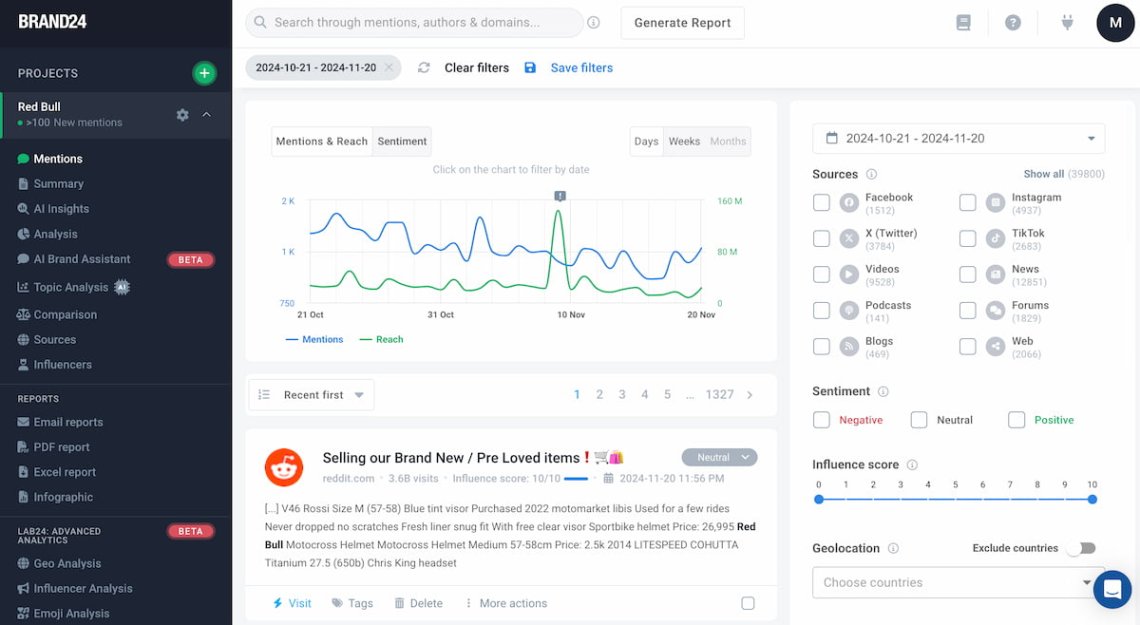
Então, como você verifica a reputação de sua marca atual?
- Realizar análise de sentimentos
Acompanhar o volume e o alcance dos mentions de sua marca é legal, mas definitivamente não é suficiente para avaliar sua reputação atual.
O que realmente importa são as emoções que levam as pessoas a escrever sobre sua marca. E aqui, o análise de sentimentos entra no palco!
Como o próprio nome sugere, a análise de sentimento é um método de análise de texto para identificar sua intenção.
Seu objetivo é reconhecer automaticamente os sentimentos ocultos por trás das palavras e categorizá-los em um dos três tipos: positivo, negativo e neutro.
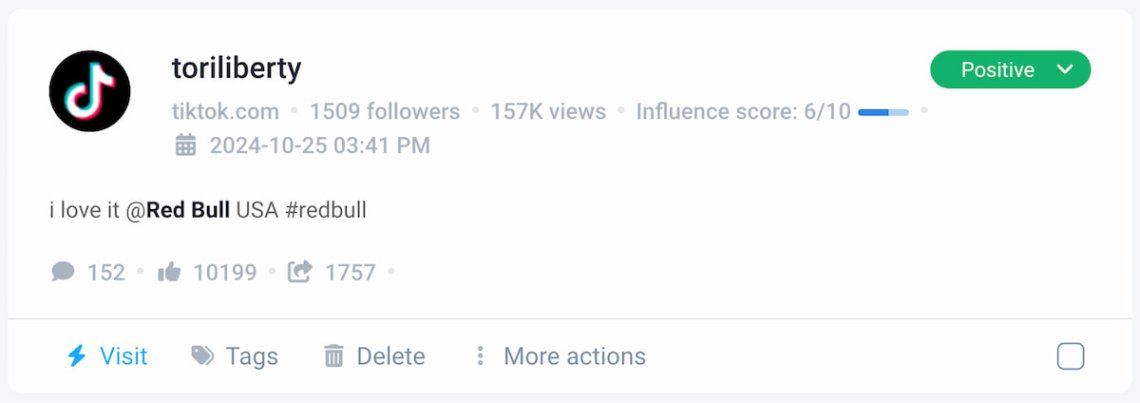
Você pode analisar cada mention um por um, mas isso consome muito tempo, especialmente se você tiver centenas ou até milhares deles.
Felizmente, o Brand24 apresenta todos os seus mentions em um gráfico intuitivo. É super simples - se a linha verde subir, o sentimento positivo está crescendo; se a linha vermelha subir, o sentimento negativo está aumentando.
Veja o exemplo abaixo:
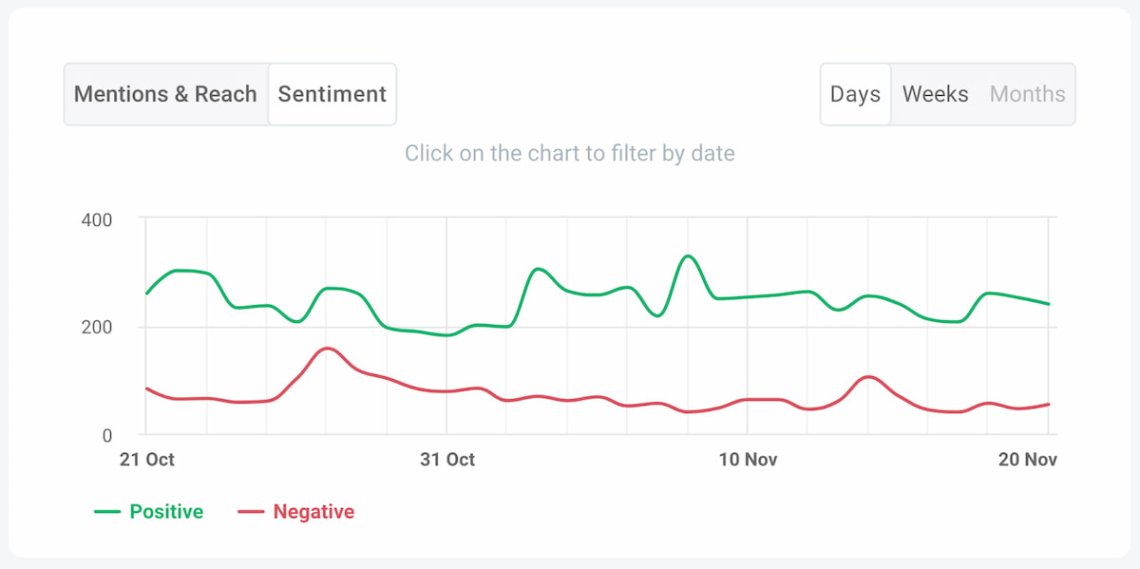
É o gráfico de análise de sentimento da Red Bull abaixo. A marca obviamente vai bem em termos de reputação!
Bônus: Leia sobre como fazer análise de sentimento do cliente com IA em 2025 [um guia passo a passo].
- Verifique sua pontuação de presença
A segunda métrica útil para verificar se seus esforços de marketing de reputação são suficientes é a Pontuação de presença.
Como o próprio nome sugere, essa métrica mostra a presença on-line de sua marca. Quanto mais mentions e alcance dos mentions de sua marca, maior será sua pontuação de presença.
E, como você deve ter adivinhado, aumentar sua visibilidade on-line é essencial para a reputação de uma empresa.

Verifique sua análise de sentimento e Presence Score agora!
02 Definir metas claras
Não é possível planejar uma estratégia de marketing de reputação sem definir metas.
Portanto, determine o que você deseja alcançar!
Podem ser coisas como:
- Melhorar as classificações on-line
- Aumento das avaliações positivas
- Melhorar a percepção da marca em áreas específicas
O acompanhamento de suas metas de marketing de reputação é fundamental, pois pode afetar diretamente o desempenho dos negócios e ajudá-lo a medir a eficácia de sua estratégia.
Defina seus objetivos de marketing de reputação com o Brand24!
Certo, mas como descobrir quais áreas podem lhe trazer o maior ROI quando se trata de seu marketing de reputação?
Bem, há dezenas de conselhos que eu poderia lhe dar. Mas vou simplificar em uma coisa: Pergunte à IA!
Vivemos na era da inteligência artificial. Portanto, não tenha medo de usá-la!
No entanto, em vez de confiar em chatbots de IA genéricos, foco em ferramentas especializadas de IA projetadas para marketing de reputação. Por quê?
Porque essas ferramentas podem acessar dados detalhados e específicos da marca, o que lhes permite fornecer insights mais precisos e personalizados.
Por exemplo, o Assistente de marca com IA funciona como o ChatGPT, mas acessa dados reais do seu projeto de monitoramento de mídia
Eu fiz uma pergunta: "Em que a Red Bull deve se concentrar se a marca quiser melhorar seu marketing de reputação?".
Em apenas 15 segundos, o assistente de marca me forneceu 6 dicas práticas para aprimorar os esforços de marketing de reputação da Red Bull.
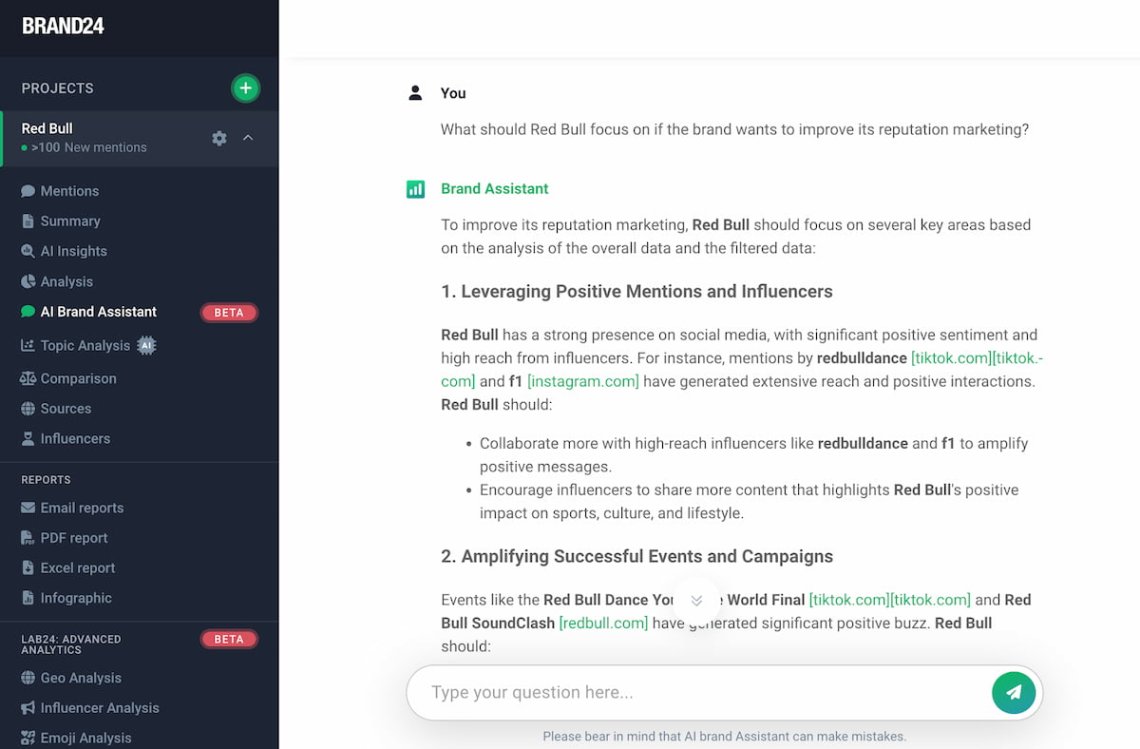
Cada dica foi explicada com precisão e com base em dados.
Fantástico!
Acesse o AI Brand Assistant!
03 Incentivar as avaliações dos clientes
As avaliações são um dos fatores mais importantes para melhorar a presença on-line de sua marca. Elas informam como as pessoas reais percebem seus produtos ou serviços.
De fato, de acordo com o Estudo da BrightLocalEm um estudo realizado em 2008, 50% dos consumidores confiam nas avaliações on-line tanto quanto nas recomendações pessoais de amigos e familiares.
Especialmente as pequenas empresas devem investir em incentivar os clientes satisfeitos a escreverem mentions positivos, pois ainda não há muitos deles disponíveis on-line.
É simples. Se sua marca não for bem conhecida (ainda), seus clientes em potencial provavelmente procurarão opiniões sobre sua empresa on-line.
Além disso, as avaliações positivas dos clientes em plataformas de avaliação de terceiros, como Google Business Profile, Yelp e Trustpilot, podem influenciar significativamente as decisões dos clientes em potencial, pois essas plataformas são vistas como fontes mais confiáveis.
Quanto mais avaliações positivas você receber, maior será a probabilidade de as pessoas comprarem seus produtos.
Veja como as pessoas avaliam sua marca!
04 Amplificação do conteúdo positivo da marca
De acordo com Centro de marketing de influênciaEm um estudo de mercado, 72% dos consumidores consideram as avaliações e os depoimentos de clientes mais confiáveis do que quando uma empresa ou marca fala sobre si mesma.
O que isso significa para você?
Para usar todo o potencial das avaliações positivas, você deve exibi-las:
- Destaque depoimentos e avaliações positivas em seu site.
- Compartilhe-os em suas postagens de mídia social, boletins informativos e outros materiais de marketing
- e amplie seu alcance e impacto!
Aqui está um exemplo real de um bom marketing de reputação on-line:
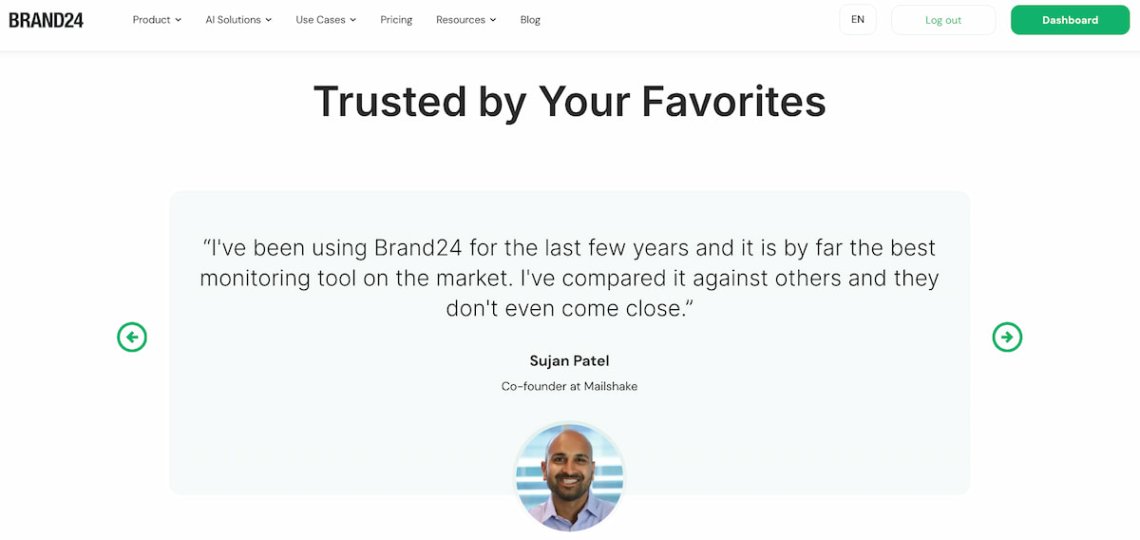
Apresente estudos criando histórias ou conteúdos atraentes sobre o sucesso do cliente.
Confie em mim, isso funciona muito bem, especialmente no marketing B2B!
Não pare por aí e adicione feedback positivo aos seus materiais de marketing nas plataformas de mídia social.
De acordo com o estudo How Shopper Behavior is Changing (Como o comportamento do comprador está mudando)Em um anúncio que apresenta avaliações, as taxas de cliques são quatro vezes mais altas e duas vezes mais baratas em termos de custo por aquisição e custo por clique.
Experimente a melhor ferramenta de marketing de reputação!
05 Envolva-se com seu público
O envolvimento com os clientes em plataformas de mídia social, sites de avaliação e outros fóruns on-line é extremamente importante.
E há muitas estatísticas que comprovam isso!
Basta mention que as marcas que se envolvem com seus clientes nas mídias sociais possam reduzir seu custo por contato em 83%
Simplificando, responder ao feedback positivo e negativo compartilhado em avaliações, comentários e mensagens mostra que a marca realmente valoriza a opinião de seus clientes.
De fato, os clientes esperam que as empresas respondam prontamente aos comentários positivos e negativos, o que é fundamental para um marketing de reputação eficaz.
Além disso, ser responsivo aumenta sua genuinidade e mostra que há pessoas reais por trás da marca (especialmente em tempos de IA substituindo humanos sempre que possível).

Sempre elogie as pessoas que falam positivamente sobre você nas plataformas de mídia social!
Não há nada pior do que deixar o conteúdo gerado pelo usuário sem supervisão.
E não importa realmente se a avaliação promovida é positiva ou negativa.
De acordo com o estudomentioned BrightLocal acima, 88% dos clientes provavelmente usarão uma empresa com base na forma como ela responde às avaliações on-line.
Potencialize seu marketing de reputação com o Brand24!
06 Tratar o feedback negativo de forma construtiva
O feedback negativo do cliente tem dois lados:
- Pode ser uma chance de melhorar seu produto ou serviço
- Isso também pode prejudicar sua reputação.
A maneira como você lida com isso é o mais importante.
Considere estas estatísticas importantes:
- 52% dos clientes esperam uma resposta em uma semana;
- 96% dos consumidores procuram especificamente por avaliações negativas antes de decidir clicar em "Comprar".
Isso significa duas coisas.
Primeiro, você deve responder rapidamente aos comentários negativos.
Em segundo lugar, quando você responder, faça-o com compreensão, peça desculpas, se necessário, e ofereça uma solução clara.
Fazer isso não apenas resolve o problema, mas também mostra a outros clientes em potencial que estão observando como você lida com as críticas.
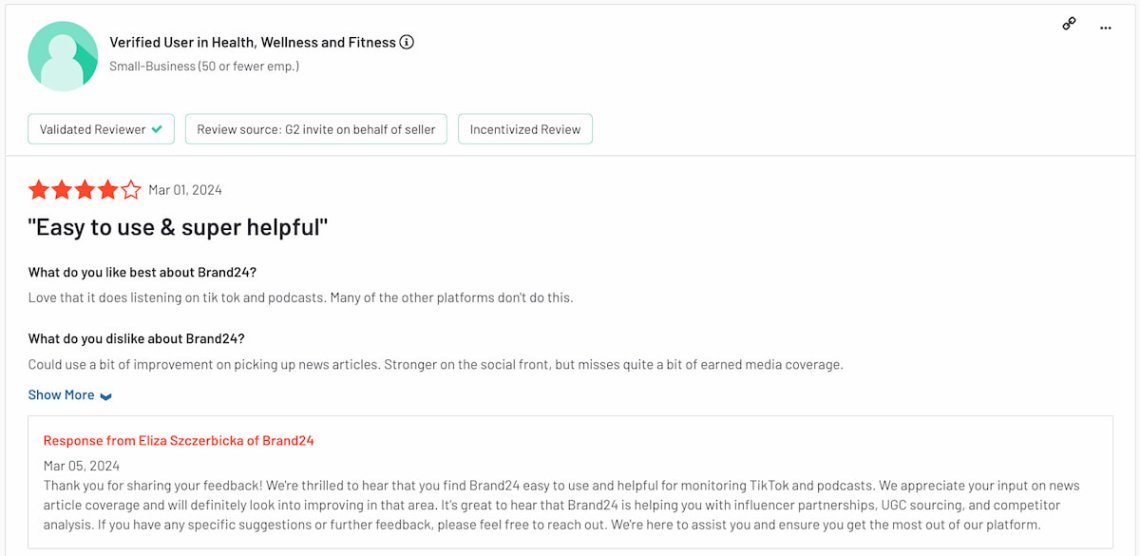
Além disso, uma estratégia que você deve usar para evitar comentários negativos é simplesmente incentivar os clientes satisfeitos a deixar comentários positivos e exibi-los em seu marketing.
No final, lembre-se das palavras de Warren Buffet: o feedback é um presente. Mesmo o negativo, porque cria a chance de construir um negócio melhor.
Se você tiver dificuldades para gerenciar críticas negativas, consulte nosso artigo: Como responder a críticas negativas?
07 Desenvolva sua experiência no nicho
Tornar-se um especialista em seu setor dá um grande impulso à sua reputação on-line.
Quando as pessoas o veem como uma autoridade confiável, é mais provável que o façam:
- Valorize suas opiniões
- Recomendar sua marca
- Comprar seus produtos ou serviços
Para desenvolver o conhecimento especializado do nicho, você deve compartilhar constantemente insights valiosos.
Como fazer isso?
1. Criação de conteúdo
Seu site é um dos ativos de marca mais poderosos para seus esforços de marketing de reputação.
Por quê?
- Em primeiro lugar, ele está totalmente sob seu controle. Você pode criar e distribuir conteúdo que destaque os aspectos positivos, os valores, as conquistas, o envolvimento da comunidade e as histórias de sucesso dos clientes da marca.
- Em segundo lugar, o conteúdo de alta qualidade tem o potencial de se tornar viral, o que significa aumentar sua reputação.
- Em terceiro lugar, a criação de conteúdo valioso e de qualidade aumenta a otimização de seu mecanismo de pesquisa e visibilidade da marca em mecanismos de pesquisa como o Google.
Se as postagens do seu blog aparecerem em páginas de classificação de mecanismos de pesquisa competitivos, isso comprovará sua autoridade dentro do seu nicho e aumentará a reputação on-line da sua marca.
2. Webinars
Organizar webinars é outra excelente maneira de estabelecer sua experiência no nicho e aprimorar sua reputação on-line.
Por quê?
- Os webinars permitem que você compartilhe conhecimento aprofundado diretamente com seu público,
- Eduque as pessoas sobre seu produto,
- Interaja com eles em tempo real,
- Mostre sua experiência de uma forma mais pessoal e interativa.
Ao oferecer insights valiosos e práticos, você fortalece sua reputação, cria confiança e promove relacionamentos com seu público.
Além disso, você pode convidar especialistas ou influenciadores do setor para co-apresentar seus webinars.
Isso não apenas acrescenta credibilidade ao seu evento, mas também amplia seu alcance quando eles o compartilham nas mídias sociais.

Falando sobre colaboração...
- Parcerias
As parcerias também podem desempenhar um papel crucial no gerenciamento da reputação.
Colabore com influenciadores de mídia social, líderes do setor ou outras marcas para cocriar conteúdo ou iniciativas que possam melhorar a reputação da marca.
Certifique-se de que todas as colaborações e conteúdos reflitam e promovam os valores de sua marca para criar confiança e consistência.
Quando bem feito, marketing de influência pode gerar muito reconhecimento positivo nas mídias sociais, ampliando o conteúdo positivo da marca.
Experimente a melhor ferramenta de marketing de reputação de todos os tempos!
08 Educar os funcionários
Acredite ou não, educar seus funcionários é fundamental para o marketing de reputação.
Seus funcionários podem ser poderosos defensores da marca.
Incentive-os a compartilhar experiências e percepções positivas sobre a empresa em suas redes pessoais.
Funcionários felizes são um selo de aprovação de suas operações, e uma boa marca do empregador também pode fazer parte de seus esforços de marketing de reputação.
Potencialize seu marketing de reputação!
09 Desenvolver um plano de gerenciamento de crises
Pesquisa Global de Crise e Resiliência da PwC mostra que 96% das organizações sofreram interrupções ou crises no período de 2021 a 2023.
E vale a pena ressaltar que 9 em cada 10 dessas crises não estavam relacionadas à pandemia.
Enquanto isso, Pesquisa da TrustPilot mostra que uma reputação positiva da marca é o fator mais importante para os consumidores ao optarem por se envolver com uma empresa.
Essas estatísticas deixam claro um aspecto: a reputação de sua marca é tudo... e as crises podem acontecer a qualquer momento com qualquer pessoa.
É por isso que ter um comunicação de crise plano é essencial.
Prepare um gerenciamento de crises de reputação de marca para lidar com possíveis ameaças de forma eficaz e garantir uma resposta rápida e coordenada quando surgirem problemas.
Um software de marketing de reputação pode ser de grande ajuda para isso:
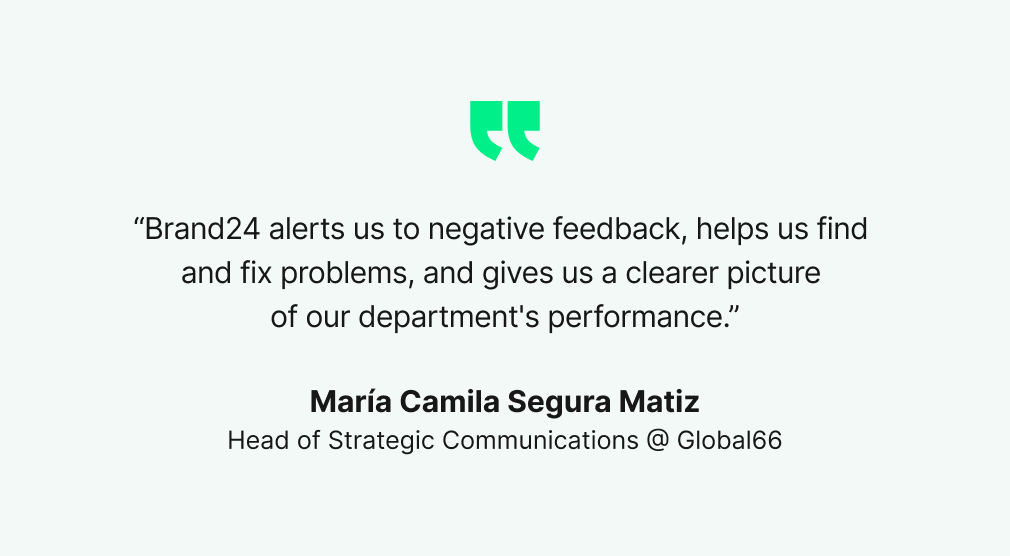
Você pode ler a história completa neste <strong>estudo de caso</strong>.
Esteja pronto para uma crise que está chegando!
10 Monitore sua reputação on-line continuamente
O marketing de reputação não é um processo episódico, mas contínuo, de avaliações e aprimoramentos.
Todas as boas estratégias precisam ser analisadas e ajustadas, pois é um processo contínuo.
Portanto, você deve tornar o monitoramento de sua reputação on-line um hábito.
O monitoramento regular não apenas ajuda a responder ao feedback, mas também desempenha um papel crucial na manutenção e no aprimoramento da imagem da sua marca nos canais digitais.
Você pode usar um software de marketing de reputação como o Brand24 para medir o progresso em direção aos objetivos e ajustar as táticas conforme necessário.
Ok, espertinho, mas como?
Você pode fazer isso manualmente, analisando seu sentimento (descrevi isso em detalhes na primeira etapa).
Mas se você precisar de uma abordagem mais automatizada e abrangente, use o poder do Insights sobre IA.
Em resumo, é uma guia com tecnologia de IA que mostra as conclusões, os gráficos e as métricas mais importantes em um só lugar.
Ao falarmos sobre o monitoramento de sua reputação, você deve prestar atenção especial a Tendências e Recomendações.
Na prática, você pode usar informações de Tendências para estar sempre um passo à frente:
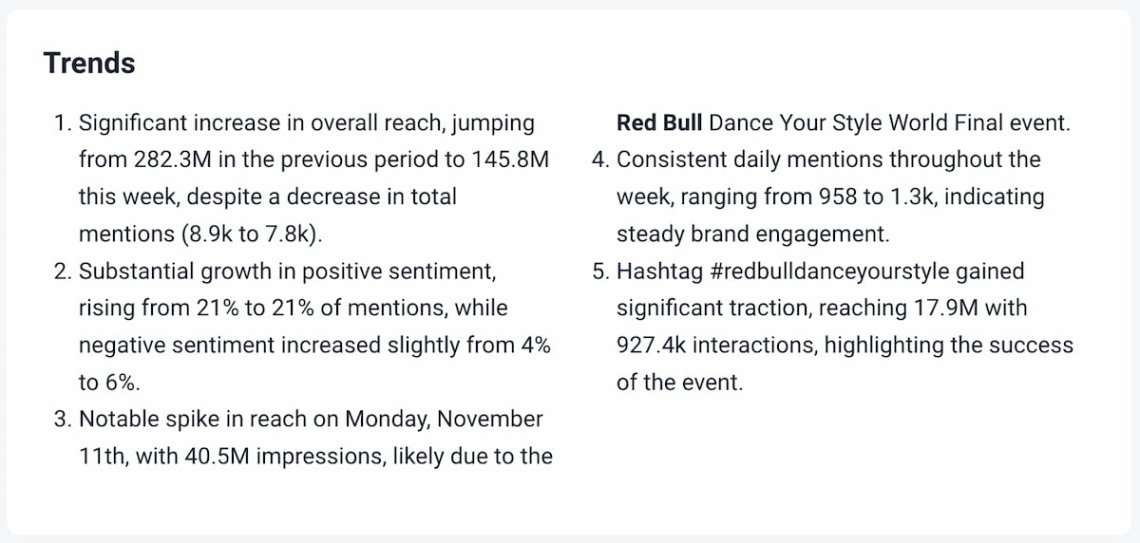
Quanto a RecomendaçõesComo a reputação da sua empresa é uma questão de tempo, essas são sugestões baseadas em dados sobre como você pode melhorar sua reputação aprimorando suas campanhas existentes.
Use-os com sabedoria!
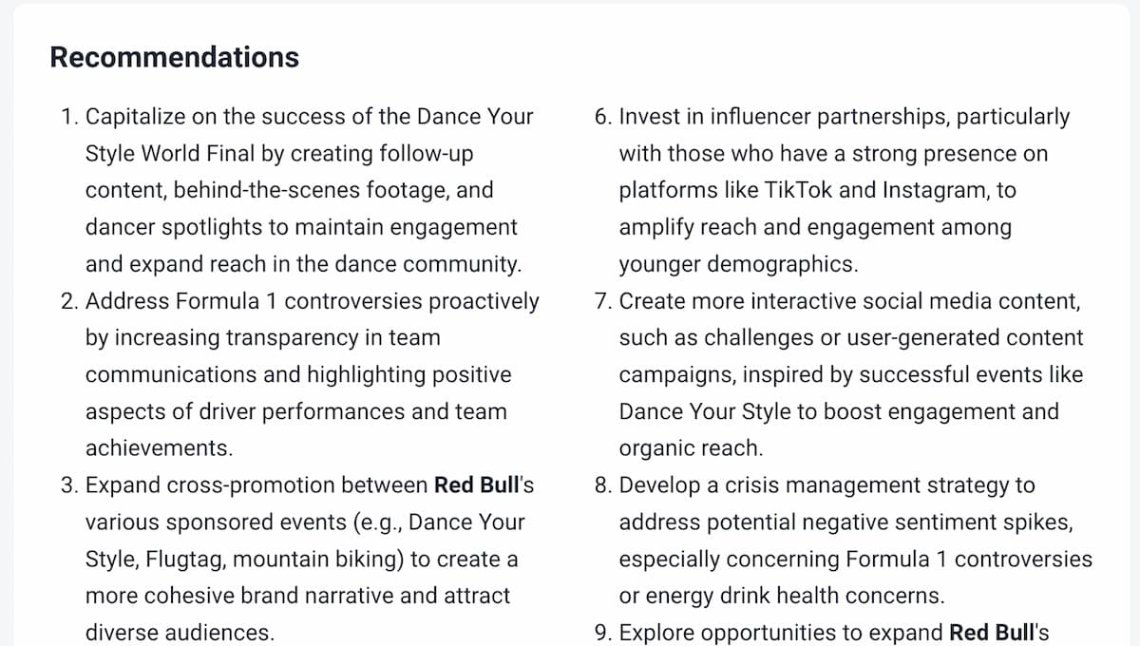
Use o poder da IA para melhorar sua reputação!
Por que o marketing de reputação é importante?
Essa pode ser uma pergunta óbvia, mas há alguns fatores adicionais que você deve implementar no gerenciamento da reputação em sua estratégia de negócios.
Aqui está uma lista dos 10 motivos mais importantes para cuidar de uma estratégia de marketing de reputação:
- Confiança e credibilidade. Uma reputação positiva estabelece confiança. Os clientes que confiam em uma marca têm maior probabilidade de comprar dela, permanecer fiéis e até mesmo pagar um preço mais alto.
- Influenciar as decisões de compra. Os consumidores geralmente pesquisam as marcas antes de tomar decisões de compra. Avaliações positivas e uma boa reputação podem influenciar as decisões a favor de uma marca.
- Referências boca a boca. Uma reputação sólida impulsiona marketing boca a boca. Clientes satisfeitos têm maior probabilidade de recomendar a marca a outras pessoas.
- Vantagem competitiva: Em mercados saturados, uma boa reputação pode diferenciar uma marca de seus concorrentes, tornando-a a escolha preferida dos consumidores.
- Maior fidelidade do cliente. As marcas com reputação positiva geralmente apresentam maior fidelidade e retenção de clientes.
- Resiliência em crises. As marcas com reputação sólida estão mais bem posicionadas para resistir a crises. Elas geralmente recebem o benefício da dúvida e podem se recuperar mais rapidamente.
- Benefícios financeiros. Uma boa reputação pode levar ao aumento das vendas e da lucratividade. Por outro lado, danos à reputação podem levar a perdas financeiras significativas.
- Atração e retenção de talentos. As empresas com boa reputação têm mais facilidade para atrair e manter funcionários qualificados.
- Custos de marketing mais baixos. A manutenção de uma boa reputação pode reduzir os custos de marketing e de aquisição de clientes, pois o boca a boca positivo e a confiança aliviam a necessidade de campanhas promocionais agressivas.
- Relações com as partes interessadas. Uma reputação positiva facilita melhores relacionamentos com as partes interessadas, incluindo parceiros, fornecedores e investidores.
Em resumo:
A reputação é fundamental no marketing e nos negócios. Ela é a base de quase todos os aspectos da interação do consumidor com uma marca e pode afetar significativamente o sucesso de uma empresa a longo prazo.
Aumente seu marketing de reputação!
PERGUNTAS FREQUENTES
O que é estratégia de reputação?
Uma estratégia de marketing de reputação refere-se a uma abordagem planejada e estruturada para moldar e manter a percepção de uma marca, empresa ou indivíduo aos olhos de seus acionistas.
Essa estratégia é essencial para criar confiança, gerenciar crises, diferenciar-se dos concorrentes e atingir metas comerciais de longo prazo.
Monitore sua reputação on-line em tempo real!
Qual é a diferença entre marketing e gerenciamento de reputação?
- O gerenciamento da reputação consiste em manter e proteger a imagem de uma marca.
- O marketing de reputação é diferente, pois se trata de usar e aprimorar essa imagem para atingir melhor os objetivos de marketing.
Na prática, enquanto o gerenciamento da reputação se concentra no monitoramento e na resposta a avaliações, feedbacks e mentions para manter ou reparar a imagem de uma marca, o marketing de reputação vai além.
Ele promove e amplia ativamente os elementos positivos da reputação para impulsionar os esforços de marketing.
Talvez você também se interesse por: 6 dicas de especialistas para dominar o gerenciamento da reputação da marca
O que é um exemplo de reputação?
"Reputação" refere-se à percepção ou avaliação coletiva de uma marca, empresa, indivíduo ou entidade com base em ações, comportamentos ou desempenho anteriores.
Aqui estão alguns exemplos para ilustrar a reputação:
- A Apple é conhecida por sua abordagem centrada no design e por seus produtos fáceis de usar. A empresa tem a reputação de produzir dispositivos tecnológicos inovadores e de alta qualidade.
- Por outro lado, a Volkswagen sofreu um revés em sua reputação com o escândalo "Dieselgate", quando foi descoberta manipulando testes de emissão de poluentes.
Embora a empresa tenha tomado medidas para se recuperar, o incidente deixou uma marca em sua reputação por algum tempo.
Evite uma crise de relações públicas!
O que é reputação de marca?
A reputação da marca, muitas vezes chamada simplesmente de reputação da marcaA marca é a percepção e a impressão coletiva que os consumidores e outras partes interessadas têm sobre uma marca.
Ele se baseia em suas experiências, interações e exposição às mensagens, ações, produtos e serviços da marca ao longo do tempo.
É a interseção dos esforços de branding de uma empresa (como ela quer ser percebida) e as opiniões e sentimentos reais das pessoas sobre a empresa.
Potencialize seu marketing de reputação!
Conclusão
É mais do que apenas uma estratégia. O marketing de reputação gera confiança, atrai clientes e gera sucesso comercial de longo prazo.
Escuta social ferramentas como o Brand24 garantem que você fique à frente de possíveis problemas e maximize seus esforços.
É preciso aceitar o fato de que as crises são quase inevitáveis.
Mas com um plano de comunicação de crise bem elaborado e uma abordagem proativa, você pode transformar os desafios em oportunidades de crescimento.
Ao priorizar a sua reputação e integrá-la à sua estratégia geral de marketing, você pode criar uma impressão positiva e duradoura que gera confiança, inspira a fidelidade do cliente e permite que você cresça.
Principais conclusões:
- O marketing de reputação não é um esforço único, mas um processo contínuo. Isso requer uma abordagem estratégica e um monitoramento regular.
- Até mesmo o feedback negativo pode ser um presente - Ele fornece insights valiosos para melhorar e fortalecer seus negócios, bem como aprimorar suas habilidades de gerenciamento de riscos. reconhecimento da marca.
- Apresente histórias de sucesso e estudos de caso para destacar resultados do mundo real, criar confiança e fornecer resultados concretos.
- Use ferramentas de IA como o Brand24 para avaliar sua reputação atual e monitorar seus esforços de marketing de reputação.
Inicie agora o teste gratuito de 14 dias do Brand24 e aprimore sua estratégia de marketing de reputação!






